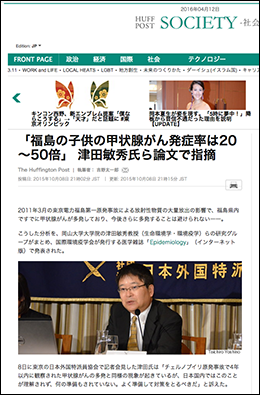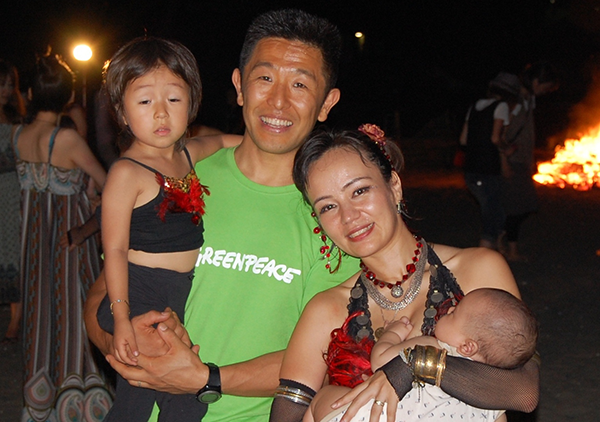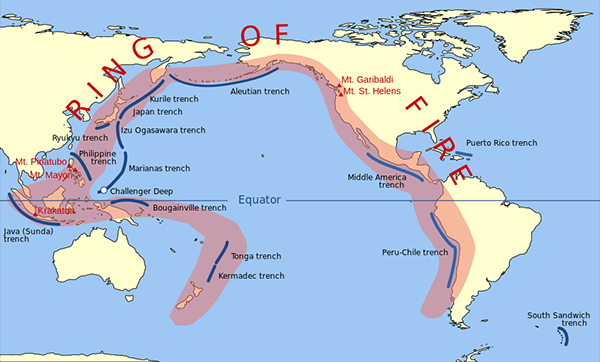JAPAN. Five years after Fukushima – the worst nuclear disaster in human history. Five years went past since Fukushima Daiichi Plant changed many people’s lives. My family was one of those people. After a couple of months from 3/11, my wife and I made the toughest life decision to leave our own country for good.
By Toru Bové (all articles) | Toru’s Facebook profile
We took the decision based on being parents. As radioactive contamination has spread, Japan was no longer safe place for the small ones. We look back today, witnessing the changes in Japan. We have no regrets. We are never going back there.
Cancer on the rise
 168 children out of 370 000 in Fukushima have already been diagnosed with pediatric thyroid cancer or are strongly suspected to have the disease. Many of them had operations to take out their thyroid glands. Before the disaster, the particular cancer was very rare and the authorities said they find only one or two in one million children. Today, one in two thousands.
168 children out of 370 000 in Fukushima have already been diagnosed with pediatric thyroid cancer or are strongly suspected to have the disease. Many of them had operations to take out their thyroid glands. Before the disaster, the particular cancer was very rare and the authorities said they find only one or two in one million children. Today, one in two thousands.
As the data came out from the downplaying government, we interpreted it as the tip of an iceberg. Doctors and researchers keep warning us that it is not only youth to worry for, also grown ups are also suffering as well. Fukushima is a very unique case, an event where three reactors exploded with subsequent meltdowns – including one MOX reactor – has nothing to compare with. We only can assume how bad it is going to be.
Though we were never able to ”put” radioactivity back into those reactor containers anymore, we still had some hope for a “strike-back” by our democracy. We hoped the government would not be able to restart nuclear plants against people’s will, we hoped we could stop the government to go further with its militarization and more importantly, constitution reform.
The peaceful constitution was a backbone of Japan’s 70 years long peace era. In the last short 60 months, our hopes were simply shattered one after another. By doing so, Abe government has been driving the nation into an abyss. It finally changed the “understanding of constitution” so they can send their troops abroad. Yes, Abe can send the self-defense-military, number 9th in the world, abroad.
In October 2015, Japan started up ATLA, Acquisition, Technology and Logistics Agency, by placing 1800 officials to support Japan’s new economic hope, weapons export. Japan and Australia have been negotiating a large submarine contract which can become nice opening fire work for ATLA. The world map of military suppliers is moving to the next chapter in a huge step.
And by the same trend, the nuclear plant restarting process was not challenged by thousands of protesters. Post-Fukushima time gave the government the wrong kind of confidence, they carry the process so they can turn the full nuclear circle again very soon.
US had nuclear weapons on Japan’s soil for decades
The public learned that the US military brought in and kept nuclear weapons on our soil for more than five decades while Japan government kept telling there were no nukes.
We know now Japan possesses 47 tons of plutonium while the world is jumping up and down pointing the fingers at North Korea which is assumed to possess only 40 kg plutonium.
Japan’s 47 tons is outstanding as a nation which doesn’t possess nuclear weapons and I should mention that Director General of International Atomic Energy Agency is a Japanese diplomat since 2009.
Japan’s leaders are playing with words
Japanese is a very convenient language. Its government is probably the best expert to utilize it for a very long time in the history. In English, nuclear is nuclear. Nuclear weapon and nuclear plant. In Japanese, the former is “Kaku” and the latter is “Genshiryoku”. In the WWII time, Allies called themselves the United Nations. Japan called “Rengokoku”. After the war, Japan was under occupation by US and colleagues, it started to call today’s United Nations “Kokuren”. The list of wordplay continues.
Many have been led to believe that nuclear for weapons use and nuclear for energy use were completely different. “Genshiryoku” was used for peaceful energy because “Kaku” remind of Hiroshima and Nagasaki. It has been a big lie from beginning with an evil reason, obtaining a power to make nuclear weapons. Today, many politicians openly say Japan should possess nuclear weapons as soon as possible. If they tried to say that 10 years ago, it simply meant an instant political suicide. The mood has changed completely now with the wrong confidence.
Image: The Pacific Ring of Fire, Wikimedia Commons
Japan on the ring of fire
If you look Japan closely, it is very difficult to find any hope today. Many Japanese regard their own country already as in a “prewar time”. Economical struggle and super-aging issue are pressurizing peoples daily lives. The tone of mainstream media is dark and heavy with many bad news. Not only the number of strange criminals and accidents, the earth’s activity often makes the headlines. Volcanos and earthquakes. As a part of The Pacific Ring of Fire, and only five years from the large geographical event, the Magnitude 9.0 earthquake, Japan’s ”basement” is very active.
For people who has some common sense, it doesn’t make any sense with once 54, now 42, nuclear reactors on top of a volcano island with 110 active volcanos over a boundary of four tectonic plates. No one would be surprised if we see another Fukushima. Japan is shifting and moving forward to an edge of a cliff. We, as many others, jumped off from the ship.
Zombie companies
Yet, there are signs and hopes when you turn our eyes to global nuclear industry. Giant players such as Areva and Toshiba, are struggling to stay on their course. Both are facing big financial troubles as they now became showcases of dead ends. It is becoming more clear that it is very difficult to make any money from nuclear energy except hard-selling the dangerous plants to developing countries. Their limited future is only found in decommission business, in other words, digging their own graves. These days, I call a nuclear company, a zombie company. They are dead already but still walking around. The worst thing is that they still can kill you today and in the future. We really have to get rid of them ASAP.
Many countries have ignored the important facts about Fokushima
Since I moved to Scandinavia in mid 2011, I kept wondering why people in Europe, except Germany and some others, were not really informed about Fukushima in details. Today, I start to understand that other news overrode Fukushima during the year. Exact five years ago, the world was busy to follow news about Libya, and then Syria has started a fire.
Recently I have spoken with a young Swede about Fukushima and she said “we heard about it for two days or something when it happened, then we haven’t heard anything”. That was that in March 2011. It is time to dig deep into this case again. We will fail to learn from one of the most important life lessons if we do not face it now.
You cannot smell or feel radioactivity
A great danger with radioactive contamination is that we tends to forget or/and to get used to it. We can not see, smell and feel radioactivity. Once our body feel something, it can be too late. As a whole western society is aging, we really can not separate out true negative effects of radioactivity.
I had an early sour lesson about how powerless experts can be. Not long after the accident, I had a chance to talk with an expert who was preparing for a field research. By the time, we were facing a risk of another explosion. I asked how do we know when that happens. I wanted to know how much time we have to run. He said if that happens, the government would tell us but I disagreed.
He was reluctant to send some warnings to the public as he think it could trigger a panic. After I gave up to convince him. I made a clear question.
“If you have your own younger sister with her baby in Tokyo right now. What do you tell her ?”
He said, “you have to get away now”.
Enough said. I swiftly walked out the room and collected my friends. We called as many mothers we knew, to get out. For some mothers, the call changed their course of life. I have no right to blame this man. He was more a researcher than an activist. I was driven to help many children as possible. My message was too strong sometimes, so some had to ask me why I did like this. In short conversations, they picked it up.
I didn’t really care much about mothers hesitation, pride and doubt. I knew that I had to encourage them to help children as they could not leave by themselves. I never had a much chance to share our experience in past as I focused more about general stuffs in my lectures, interviews and articles. The first 21 days were like we were dealing with an invisible war. It took four months and a long journey for my family to start to feel safety.
It’s too naive to think that everything settled after five years. It is only that people got used to the situation and many of them just forgot about it. Still, no one knows where those melted nuclear fuel rods are and there is no technology “yet” to collect them.
Japan government was saying that it would take 40 years to shut down. That was five years ago. Today, they still say 40 years form now. They may think we are so dumb with simple math?
People are falling and dying
Mainstream media started using new buzz word, “Tashi-Shakai” meaning a-death-ridden-society or a high-rate-death-society. Japan is a frontrunner of super-aged-society. It was meant to become that kind of a society long before Fukushima but I personally believe that Fukushima pushed up the trend. Probably, in very large scale.
| DID YOU FIND THIS ARTICLE USEFUL?
Please feel free to donate a dollar to NewsVoice (Sasser Media Lab). One dollar equals about 6 SEK (Swedish Crowns). |
Famous packed-up-morning-trains in rush hours are forced to stop often as someone jumps or falls. It’s becoming normal life to see one or two people laying down in street when you do morning commuting. TV programs cover so many stories about “how we die”.
There are months of extended waiting at funeral centers which can not handle the numbers. Japan is no longer the country in rise, and we are not really sure how 2020 Olympic would be. Next four years, Japan tries best they can to cover up Fukushima crisis but the truth will come out.
Five years past, and my message remains the same. Stay away from Tokyo and watch out for Japan.
By Toru Bové (all articles) | Toru’s Facebook profile
Related
Pediatric thyroid cancer, Japan:
Huff Post: Tsuda toshihide Fukushima pandemic
Asahi Shimbun: Fukushima thyroid cancer patients’ families join forces
Sputnik: ‘Incidences of Thyroid Cancer in Children Rising in Fukushima’
Blogos: ?????????????????????????4???????
Epidemiology: Thyroid Cancer Detection by Ultrasound Among Residents Ages 18 Years and Younger in Fukushima, Japan: 2011 to 2014
US nuclear weapons on Japan’s soil
asahi.com/articles/ASJ2M6G3BJ2MTIPE021.html
mainichi.jp/articles/20160220/dde/001/040/045000c
nsarchive.gwu.edu/nukevault/Nukes-on-Okinawa-Declassified-2016
japantimes.co.jp/2016/02/20/us-admits-nuclear-weapons-stored-cold-war
People that have fallen due to suspected nuclear disease
nikkan-gendai.com/articles/view/news163113
nikkan-gendai.com/articles/view/news178732
Others supporting articles
appeal-democrat.com/national/japan-lawyer-wants-no-nukes-after-fukushima



